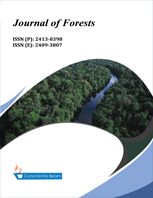Evaluation of Socio-Economic Impacts of Deforestation in Edo State, Nigeria
DOI:
https://doi.org/10.18488/journal.101.2021.81.37.44Abstract
Deforestation creates imbalances in weather patterns, making the weather drier and hotter, consequently leading to increased drought and desertification, coastal flooding, crop failures, and dislodging major vegetation regimes. The study evaluates the socio-economic impacts of deforestation in Edo State. The study utilized ArcGis digitizing tool to determine the tree population and downscale the spatial datasets using defined boundary conditions. Signal 2.0 was used to establish the relationship of linearity between the forest and economic loss over the region using R-square. Results revealed that as the rate of deforestation in Edo state rose from 4100ha in the year 1990 to 14100ha in 2016, there was also a gradual increase in economic loss from 0.7 to 10.9 billion nairas in 2016. It was also observed that the relationship of linearity between deforestation and economic loss in Edo State shows a strong relationship at an R-square of 0.97. Therefore, there is an urgent need to take action towards ameliorating new Climate Change CC problems by exploring and protecting the local values of forests in order to improve livelihood sustainability. Lowering CO2 emissions is a central global focus through the International Climate Change Policy. About a 5th of emissions globally are caused primarily by deforestation. Reducing CO2 emissions is highly dependent on the reduction of forest loss which can also contribute significantly to the low-cost mitigation portfolio.

